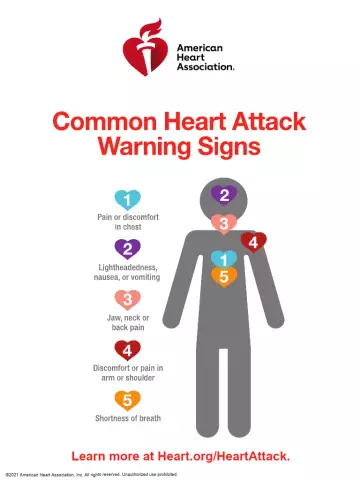- Author Rachel Wainwright wainwright@abchealthonline.com.
- Public 2023-12-15 07:39.
- Last modified 2025-11-02 20:14.
Chronic heart failure
Brief description of the disease

Chronic heart failure is a disease associated with a lack of oxygen and nutrients that the body is supplied with during the activity of the cardiovascular system. A healthy heart easily copes with this difficult task by regulating blood flow depending on the intensity of physical activity. But if any problems arise in the work of the heart, then the organs and tissues do not receive the amount of oxygen they need, which, in turn, leads to various complications and even deaths. The insidiousness of the disease lies in the fact that with the diagnosis of chronic heart failure, a person can live his whole life, not knowing that serious changes are taking place in his body.
The most common cause of chronic heart failure is narrowing of the arteries. As a rule, it is characteristic of the elderly, but in recent years, the disease has often been diagnosed in relatively young people. It should also be noted that various vascular pathologies are more often observed in women than in men. This is due to the rapid development of diseases in a strong half of humanity, which often leads to death before the vasoconstriction progresses to heart failure.
Among other factors affecting the appearance and development of pathology, it should be noted:
- hypertension;
- alcohol and drug addiction;
- hormonal disorders;
- changes in the structure of the heart valves;
- infectious inflammation of the heart muscle.
Chronic heart failure - disease classification
Depending on the effects that occur at different stages of the disease, doctors distinguish the following types of heart failure:
- Grade 1 - the disease does not lead to a significant limitation of physical activity and does not reduce the quality of life;
- Grade 2 - chronic heart failure is practically not felt during rest and leads to the installation of weak restrictions on sports and physical activity;
- Grade 3 - the symptoms of the disease disappear during rest, but during periods of intense exertion, they appear very clearly, which significantly reduces the usual working capacity;
- Grade 4 - if a person is diagnosed with such chronic heart failure, treatment should be prescribed immediately, because otherwise the disease can lead to a complete loss of performance and severe pain, which manifests itself even during rest.
Chronic heart failure - symptoms and clinical presentation
With heart failure, normal, natural blood flow is disrupted. As a result, excess fluid from the bloodstream accumulates in various organs, most often in the calves, thighs, feet, liver and abdomen. This leads to a slowdown in the rate of blood flow, an increase in pressure in the chambers of the heart and a decrease in the total amount of blood that our "motor" throws into the circulatory system.
Under the influence of the accumulation of fluid in different parts of the body, the patient's body begins to function incorrectly. People have:
- breathing disorders - due to the fact that chronic heart failure prevents the diffusion of oxygen through tissues and organs. As a rule, asthma attacks occur at night;
- sleep disorders - are the result of breathing disorders;
- rapid weight gain due to soft tissue edema;
- the occurrence of ascites - a dangerous condition when fluid accumulates inside the abdominal cavity;
- decreased performance and fatigue;
- irritability, exposure to emotional stress and stress.
Insufficient blood supply affects absolutely all vital systems of the body, leading to serious complications and deaths. For this reason, chronic heart failure, the classification of which is given above in the text, is the object of close attention of researchers from around the world. They study the influence of pathology on soft tissues and organs, look for solutions to the problem, develop new drugs and diagnostic methods.
Chronic heart failure - disease treatment

As with other diseases of the cardiovascular system, prevention of the disease remains the best treatment for heart failure. It includes a healthy lifestyle, diet, exercise, and timely visits to a cardiologist for early diagnosis of hypertension or atherosclerosis.
With regard to drug therapy. When diagnosed with chronic heart failure, treatment involves taking such groups of drugs as: cardiac glycosides, diuretics, beta-blockers and calcium channel blockers. The most effective and commonly used drug is cardiac glycosides. They were discovered at the beginning of the 18th century, but they have not lost their relevance today. This group of drugs helps to increase heart rate, improve metabolic processes and normal functioning of the circulatory system.
If chronic heart failure is caused by abnormalities in the heart valves, the patient is indicated for surgery with a heart transplant.
YouTube video related to the article:
The information is generalized and provided for informational purposes only. At the first sign of illness, see your doctor. Self-medication is hazardous to health!






